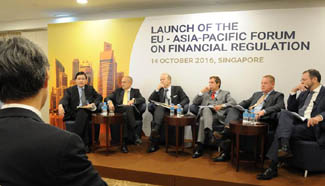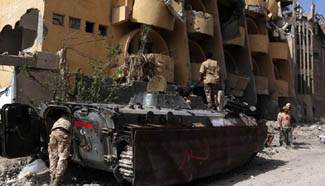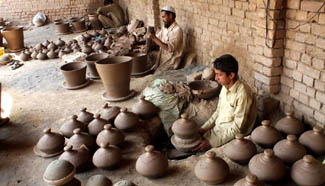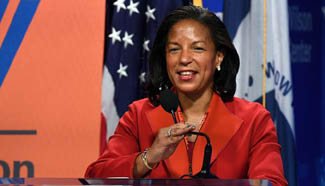by Francisco Plata Valencia
BOGOTA, Oct. 14 (Xinhua) -- Determination of the Colombian government led by Juan Manuel Santos and the Revolutionary Armed Forces of Colombia (FARC) as well as support by international community have nurtured and sustained the peace process in the country, political observers say.
Four years ago, Santos spearheaded peace talks with FARC guerrilla group, which resulted in a definitive peace agreement signed in September to end the 52-year fighting.
Later this month, the Santos government will sit down to negotiate with the country's second largest rebel force, the National Liberation Army.
Although Colombians narrowly rejected the FARC deal in an Oct. 2 referendum, the leadership has managed to keep the process on track, said Fernando Giraldo, an expert in political science with Javeriana University in Bogota.
"In the past two weeks, the president has demonstrated enormous capability, following the electoral defeat, in maintaining political control of the process," Giraldo told Xinhua.
In the wake of the poll results, Santos confidently announced that the two sides would return to the negotiating table after consulting with those who were dissatisfied with the initial agreement, namely Senator and former President Alvaro Uribe and the conservative camp he represents.
Meanwhile, the FARC group has also endeavored to find common ground with the government after the shocking outcome.
"We have been listening to different opinions, exchanging with many people of the Colombian society and political actors. Advisers on both sides are working non-stop to find a way out of this impasse as soon as possible," Rodrigo Londono, the FARC's top leader, said in a recent interview with Xinhua in the Cuban capital of Havana.
The rebel leader, who is also known as Timoleon Jimenez, said the agreement is a symbol that political contradictions in Colombia will not be resolved through violence and people will no longer be imprisoned or murdered for thinking differently.
"We are convinced this deal lays a solid primary foundation for building peace in Colombia. This is a society deeply affected by conflict, and there are very deep wounds that need to heal. To achieve reconciliation between Colombians, we must resolve our differences in the political arena, through democratic debate and not through violence," he said.
Jimenez also told Xinhua that the plebiscite result does not deny the peace deal as the agreement itself has legal foundations within international humanitarian law and is protected by the Colombian Constitution.
The rebel leader said he is confident about a "quick and effective" solution to the political impasse that will allow for definitive peace in his country.
Besides, a "favorable international climate" has played a role in encouraging and sustaining the negotiations between the government and rebel groups, according to political observer Enrique Serrano.
"This new climate served to tacitly help" the peace process, said Serrano, professor in Faculty of Political Science and Government and Faculty of International Relations of Colombia's Rosario University.
The Nobel Peace Prize that President Santos won in itself is "not enough to achieve accords," said Serrano, but as a symbol of the "backing" of the international community it can go a long way toward bolstering the negotiations.
Serrano said not only the government but also Colombian society is committed to peace, which is not limited to that with the FARC but the complete pacification of the country.










